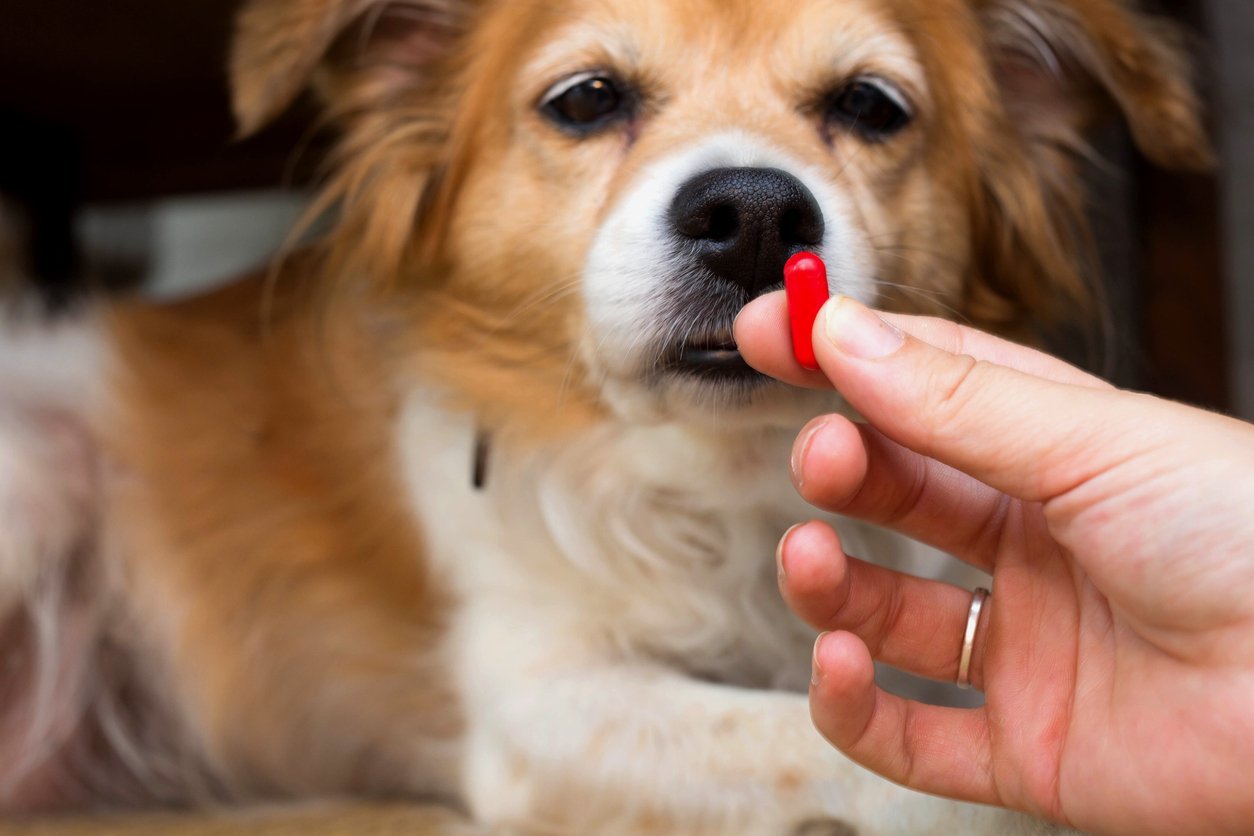Table of Contents
What’s The Difference Between Human and Canine Joint Supplements?
When it comes to the active ingredients, glucosamine, and chondroitin, in both human and canine joint supplements, these tend to differ in quality or even quantity of ingredients found in pet supplements.
The method for administering these joint supplements between humans and dogs will be different—glucosamine and chondroitin joint supplements for humans will be in pill form, whereas joint supplements for dogs will be in a liquid form or a powder form like our Tri-Acta for dogs. Why?
There are differences between the digestive system in humans and in animals. Dogs have a much shorter digestive tract and system than we do—so no, it is not necessarily wise to give your dogs human glucosamine and chondroitin. Our digestive tracts dissolve the supplements designed for our systems, whereas dogs digestive tracts dissolve the supplements designed specifically for their digestive systems.
Joint supplements for dogs are often in liquid, chew, or powder format. One of the reasons we use a powder format is because our products contain 100% active ingredients. Other formats require stabilizers, binding agents, and other inactive ingredients which are unnecessary and can cause illness in your dogs or are simply being used as filler ingredients.
We have done third party independent testing with a few different suppliers and have found that often what is being sold as chondroitin contains very little or no chondroitin at all. Depending on what test is being used, it is possible that it resembles the chemical structure of chondroitin, but in fact, does not actually contain chondroitin. Our Tri-Acta products have been third-party independently tested to confirm purity and concentration to ensure our pet supplements’ quality, efficacy, and therapeutic values are as high as can be sourced, as well as designated by Health Canada.
Added Ingredients in Human Glucosamine and Chondroitin Supplements That Can Be Dangerous To Dogs

We all know that our pets’ digestive systems are notably more finicky than that of our own. There are some foods that our pet’s stomachs can handle, but a lot of human foods can be quite dangerous for animals. When it comes to glucosamine and chondroitin supplements for humans, they tend to have more ingredients added which makes these joint supplements potentially dangerous for animals.
Xylitol and Other Artificial Sweeteners
Xylitol is a sweetener found in human joint supplements that is extremely toxic to dogs—perhaps even more toxic than chocolate is for dogs. Human glucosamine and chondroitin joint supplements containing xylitol can be extremely dangerous to give to your dogs.
Additionally, any other sweeteners added to human glucosamine and chondroitin supplements can be dangerous for your dog in other ways. Such as causing unwanted weight gains, cancer, and other diseases. While these won’t affect humans in the same way due to low levels, when it comes to the weight and size of our dogs, in comparison their bodies aren’t able to handle the same amount of these potentially dangerous supplements additives and sweeteners.
Health Regulations With Human Joint Supplements vs. Canine Joint Supplements
When it comes to joint supplements such as glucosamine and chondroitin for canines, these tend to be highly regulated and monitored. Tri-Acta supplements are third-party batch tested, and our product and ingredients are regulated and verified by Health Canada.
Glucosamine and chondroitin supplements designed for human consumption are oftentimes seen more as a dietary aid than a supplement and the FDA does not monitor or regulate these supplements.
Dosage Differences In Giving Human Glucosamine and Chondroitin To Dogs
When it comes to human glucosamine and chondroitin supplements, they are created with a dose that’s acceptable for human consumption. Note that we are quite a bit larger than our canine companions! When it comes to giving human joint supplements to dogs, there is no accurate way to gauge a proper dosage, which can result in your dog becoming ill quickly—be it through the added ingredients in the supplements, or potentially just consuming too much of the supplement itself.
My Dog Is Sick: Is It Because Of The Supplements?

If you have been feeding your dog glucosamine and chondroitin supplements designed for canines, and not for humans, you don’t have to worry if they’re experiencing any initial symptoms of illness. In our Allergies In Pets: Signs, Symptoms, Causes and Treatments blog post, we discussed the easiest ways to introduce a new supplement into your pets’ diet. If they begin experiencing any of the following symptoms after introducing a new supplement into your dog’s diet, monitor them closely:
- Nausea
- Vomiting
- Diarrhea
- Lethargy
If your dog has consumed too much glucosamine, these symptoms may occur. If the glucosamine and chondroitin supplements you have given your dog contain zinc or vitamin D, contact your veterinarian immediately, as too much of these ingredients can cause distress to your dogs.
Suggested Next Steps
Our Tri-Acta for pets supplements contain nothing but glucosamine, MSM and chondroitin to ensure your pets are receiving nothing but the best quality joint supplements. Our Tri-Acta HA Maximum Strength also has the added benefit of a species-specific form of hyaluronic acid to increase the supply and viscosity of the joint fluid.
If you’re looking for a high-quality canine joint supplement containing nothing but the essential nutrients for optimal joint and bone health, you’re looking for the difference Tri-Acta can make.
Discover how Tri-Acta supplements can help your dog not only relieve symptoms of canine osteoporosis and osteoarthritis but how our canine glucosamine and chondroitin supplements can help your dog maintain bone and joint health into old age, and prevent these diseases early.
Newsletter Signup
Subscribe to our newsletter to receive the latest news and exclusive offers.
.jpg?height=2000&name=Cliick_Integricare-DISPLAY-REVISEDV2%20(1).jpg)
Proactive & Therapeutic Joint Supplements
When given daily, Integricare joint supplements recover bone and joint injuries faster and help prevent mobility injuries from happening in the first place.











